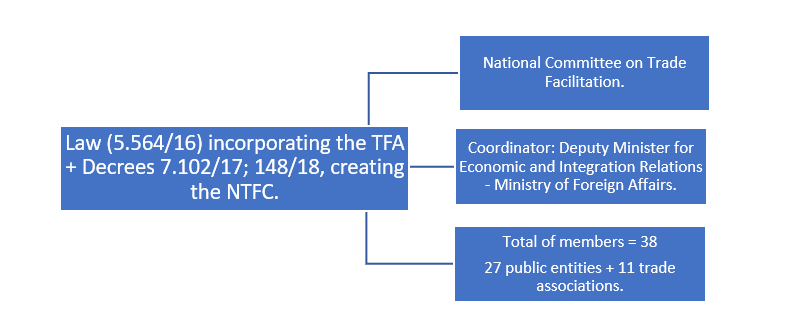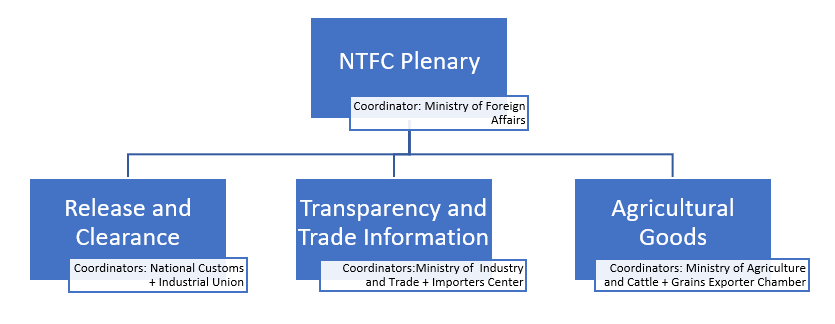Written by Roberto Recalde, Article No. 109 [UNCTAD Transport and Trade Facilitation Newsletter N°99 - Third Quarter 2023]
Trade facilitation is the most important issue for Paraguay at the World Trade Organization (WTO) considering it is a landlocked developing country where international trade plays a key role, both from an importer and exporter perspective.
For instance, production and exports of commodities is a main pillar for the economy and at the same time, many of the supplies for these activities are imported, such as seeds, fertilizers, crop protection products, machinery, among others.
Another example of this significance is the current dialogue Paraguay and Argentina are having since the beginning of 2023 over the toll the Argentinian Ports Agency are charging to Paraguayan vessels sailing through the Parana River. According to the private sector of Paraguay, this can hurt at the level of USD 50 million per year. It would not be a surprise if this matter is raised at WTO in the next moths.
Therefore, there is need to have a strong body in the country that would allow to take full advantage of the possibilities provided in the Trade Facilitation Agreement (TFA). To achieve this objective, Paraguay Trade Facilitation Committee (PTFC) was created. This publication will showcase how its structure has been adjusted over the years.
Creation of Paraguay Trade Facilitation Committee (PTFC)
From the start until the end of the negotiations, representatives from different Paraguayan institutions took an active role in the process leading to TFA in 2013. This broad participation and expertise in the matter, combined with the interest from the private sector, facilitated the ratification of this instrument in 2016, becoming one of the first countries in the Latin-American region to do so, the second in South America and the first in the Southern Common Market (MERCOSUR).
Given this broad support, compliance with Article 23.2 of the TFA happened quite fast. PTFC was created by presidential decree in 2017 with immediate participation from different institutions of the public and private sectors.
The decree establishing the PTFC provides the main elements for a permanent and well-functioning body. The mandate is clear: develop a national strategic trade facilitation agenda based on public-private dialogue. [see UNCTAD publication]
Initial structures of PTFC: 2017 - 2020
The 2017 founding decree of PTFC provided that the Chief of Cabinet of the President would chair this new body and that the Vice Ministry on Economic and Integration Relations, from the Foreign Affairs Ministry, would act as Deputy Chair. This initial structure reflects the high-level political consideration given to the committee after ratification of the TFA. Below there is a picture of the first meeting, chaired by the Ministry of Foreign Affairs and attended by other high level ranked officials from the public and private sector.
In practice, the first meetings of the PTFC were fully coordinated by the Vice Ministry team considering the need to engage more technical staff. This generated a second formal structure when in 2018, a new presidential decree established that the chair would be the Vice Ministry on Economic and Integration Relations and the Technical Secretariat’s functions will be undertaken by the Directorate of Multilateral Trade Related Organizations, both under the Ministry of Foreign Affairs. Representatives from these divisions are familiar with TFA obligations, having participated in negotiations, WTO meetings and acting as focal point for other institutions.
In 2018 and 2019, under this second structure, the PTFC started to have regular meetings, exceeding the minimum of two meetings per semester. Key areas of work, at that time, were compliance with TFA obligations and administration of projects with international organizations.
Although 27 public entities are listed in the decree that creates the PTFC, their participation depended on their level of interest. By the end of 2019, 11 trade associations were engaged in meetings with specific interactions in this more horizontal structure that could be detailed as follows:
UNCTAD’s support for a new structure
At the start of 2020, United Nations Conference on Trade and Development (UNCTAD) supported Paraguay with its Empowerment Programme for National Trade Facilitation Committees (NTFC). The COVID 19 crisis changed initial plans for the project that finally started in August with the aim to engage in a process to identify options to restructure the committee from a very concrete perspective.
The project in Paraguay began with online surveys that were answered by 31 representatives, covering 23 institutions, 15 from the public sector and 8 of the private. Based on these preliminary results and to continue the exchange, from September and October, bilateral meetings took place with institutions that responded the surveys and those who didn’t.
One-to-one remote meetings, due to the sanitary crisis, took place this time with 31 entities, 21 and 10 from the public and private sectors respectively, to discuss the results of the surveys, clarify questions and present options to empower the PTFC.
From these two initial phases, UNCTAD team proposed to the PTFC to adjust the structure by creating new bodies that would be co-chaired by representatives from the public and private sectors. Three working groups were approved in plenary session of PTFC meeting in October 2020. This created a new level in the committee’s structure with a more vertical approach, as detailed below:
During the months of October and November 2020, UNCTAD worked in the preparation of the 2021-22 PTFC agenda, prioritizing the compliance of pending commitments (10 category B and 11 category measures), considering many of the deadlines notified by Paraguay were close or have already expired.
In December, UNCTAD proposed the full package to the PTFC, including the creation of working groups, a 2021-22 agenda for the plenary and for each group, as well as a calendar of activities. Such proposals were presented in bilateral meetings, calls and in plenary sessions.
Testing the new structure
PTFC tested this new structure already at the end of 2020 and beginning 2021 with informal and formal meetings that made clear the readiness to work and the desire from all members to make quick progress.
Working groups’ coordinators proposed to address some of the pressing issues. For instance, the group on “Release and Clearance” reviewed the situation of three category C measures: TFA Article 7.6 on average release time, TFA Article 7.8 on expedited shipments and TFA Article 7.7 on authorized operators.
The working group on “Transparency and Trade Information” also resumed previous work on a draft decree to create a mechanism for consultation prior the entry into force of regulations to comply with TFA Article 2.
The PTFC and its working groups increased their meetings and exchanges that led to a more active participation in the WTO TFA Committee and new notifications in relation to category C measures and on capacity building activities, among others.
International cooperation also benefited from this new structure indirectly since the donors saw the need to establish an informal group to coordinate different activities and avoid overlapping of projects. UNCTAD also provided three training activities, facilitated the participation of WTO and its own experts on specific topics. Below there are some pictures of those engagements.
Current structure
UNCTAD Empowerement Programme ended mid 2021 and the PTFC kept its dynamic development under the same structure agreed in that year. New working groups have been established and the roadmap implemented. The number of meetings increased, as well as the certified authorized economic operators. Also, the President issued a new decree for prior consultation to comply with TFA Article 2. This resulted in the country’s compliance with the TFA is today close to 100%.
New stakeholders also requested to be part of the PTFC. Private sector participation increased not only in quantity, but also representing sectors that were absent. The following graphic summarizes and compares the situation prior to (2020) and after UNCTAD’s intervention:
| Structures | 2017-2020 | 2020-Present |
| Number of meetings | 23 | 58 |
| Certified economic operators | 3 | 14 |
| Total members in PTFC | 38 | 46 |
| TFA Compliance (%) | 82 | 96 |
Final considerations
It is clear that PTFC development, like every similar committee in the world, is unique and depends on the local engagement from public and private sectors. Therefore, adjustment and permanent review must be a main pillar. In 2022 and 2023, a new road map has been agreed with a focus on monitoring aspect to ensure follow-up and proper updates.
Political consideration should be present and activated when needed, but too much influence can hinder some of the progress. Rotation at the ministerial level is more frequent than technical officials and ideological can boost different interests.
Also, the PTFC shows that a high number of participants and meetings must be well managed, and a balanced distribution of responsibilities will help the good functioning of the body. A clear roadmap is also fundamental to have specific outcomes and keep the committee relevant.
Challenges in Paraguay are not different from the situation in other countries. The PTFC also faces limitations in the area of human resources and budget, among others, but for the moment international cooperation provides the support to solve those problems. This confirms that the TFA structure for measures B and C was useful in the task of complying with pending commitments.
Although today’s focus is based on the TFA compliance, the PTFC has the mandate to cover a broader scope, to develop a relevant national trade facilitation agenda with direct impact on the real life, on micro and small enterprises, women led companies, and in the formalization of the economy that is the main challenge in Paraguay. For this, having the structure could help in these endeavors.
Author:
Roberto Recalde is a trade policy consultant who worked at the WTO Legal Affairs Division (2009-2010), as Paraguay diplomat (2011-2017) and today advises governments, international organizations and companies on trade and investment topics.




